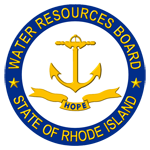About Us
The Board
Powers, Duties and Regulatory Authority
RI Gen. Laws §46-15 et seq. (1956)
The RI Water Resources Board’s statutory responsibility is to “regulate the proper development, protection, conservation and use of the water resources of the state.” The Board has broad authority in planning, developing, and managing public water supplies. Examples include authority to acquire lands, water rights, and easements for all water supply needs; design and/or construct water supply facilities; lease, sell or effect mergers of water supply systems.
The Board is comprised of and works closely with agency and community stakeholders to develop and refine policies affecting water resources, including planning for emergency supply. The RI Dept. of Administration’s Division of Planning, the RI Dept. of Environmental Management, the RI Dept. of Health, and Commerce Corporation are ex officio members of the Board.
Additional members contribute expertise and valuable perspectives on water supply and water resource management. The Board has accomplished many objectives working in tandem with the major public water suppliers in the state.
History of the Board
The Rhode Island Water Resources Coordinating Board was formed in 1964 for the explicit purpose to acquire and protect 8400 acres in West Greenwich and Coventry for the proposed Big River Reservoir Water Supply Project. In 1967, under Governor John Chafee’s leadership, the agency was renamed the RI Water Resources Board and empowered with broad legislative authority over statewide water supply. Shortly thereafter in 1970, the RI Water Resources Board Corporate was established as a water facilities and infrastructure financing arm of the Water Resources Board. Over the years, the two agencies have invested millions of dollars in scientific investigations, municipal water supply infrastructure design and construction, watershed protection, strategic planning, conservation education and policy development for public drinking water supply.
In 1993, the General Assembly declared that the Big River Management Area would be considered “Open Space” until needed for drinking water supply. During this decade, several other major engineering projects were undertaken across the state in which the agency played a significant role. Those most familiar to the public include the East Bay Bristol County Pipeline and the Providence Project. The Providence Project consists of the construction of storage and pumping facilities, and modifications to the distribution system for the new Fruit Hill Extra High Service System, located in the Towns of North Providence and Smithfield.
In 1997, the Water Resources Board assumed water supply system planning duties previously carried out by the RI Dept. of Environmental Management. In 1999, legislation was passed clarifying the powers and duties of the agency regarding its sole water allocation authority. The 1999 law also provided for a means to diversify the Board by adding two new members. The agency was granted authority to investigate sources of groundwater in the Big River Management Area after a determination that exploration or development of groundwater for future supply was indeed needed.
The Board has used effective adaptive management strategies to address statewide challenges to water resource management. The prolonged drought in 2001 signaled the need for the Board to form a Drought Steering Committee and develop a new State Guide Plan Element #724, RI Drought Management Plan. During that same year, the World Trade Towers tragedy on Sept. 11th pressed the Board to divert resources toward increased security of water resource infrastructure and information. Today, the Water Resources Board embraces an integrated water management approach that considers water and wastewater, water quantity and water quality, and provides guidance for local land use decisions.
Board Membership
| Representation per Statute (46-15.1-2) | Representation General Description |
| A person who is actively engaged in the agricultural business, preferably an owner and/or operator of an agricultural business, with respect to which appointment the governor shall give due consideration to the recommendation of the Rhode Island Agricultural Council established pursuant to the provisions of chapter 3 of title 2 |
Agriculture |
| A representative of a conservation organization, with respect to which appointment the governor shall give due consideration to the recommendation of the Environment Council of Rhode Island |
Conservation |
| A professional with expertise in geology, and/or hydrology |
Geology/Hydrology |
| A professional with expertise in engineering with relevance to water supply | Water Supply Engineer |
| A professional with expertise in financial planning and/or investment | Financial Planning/Investment |
| A professional with expertise in land and/or watershed management | Land/Watershed Management |
| Representative of a public water system that withdraws more than one hundred thousand (100,000) gallons per day, primarily from a surface water supply | Public Surface Water System |
| Representative of a public water system that withdraws more than one hundred thousand (100,000) gallons per day, primarily from a ground water supply | Public Groundwater System |
| Representative of a water user that withdraws more than one hundred thousand (100,000) gallons per day | Large Water User |
| Members of the general public | General Public |
| Members of the general public | General Public |
| Director, Department of Environmental Management | RIDEM |
| Director, Rhode Island Economic Development Corporation | RIEDC |
| Associate Director, Division of Planning within the Department of Administration | Planning |
| Director, Department of Health | Health |

